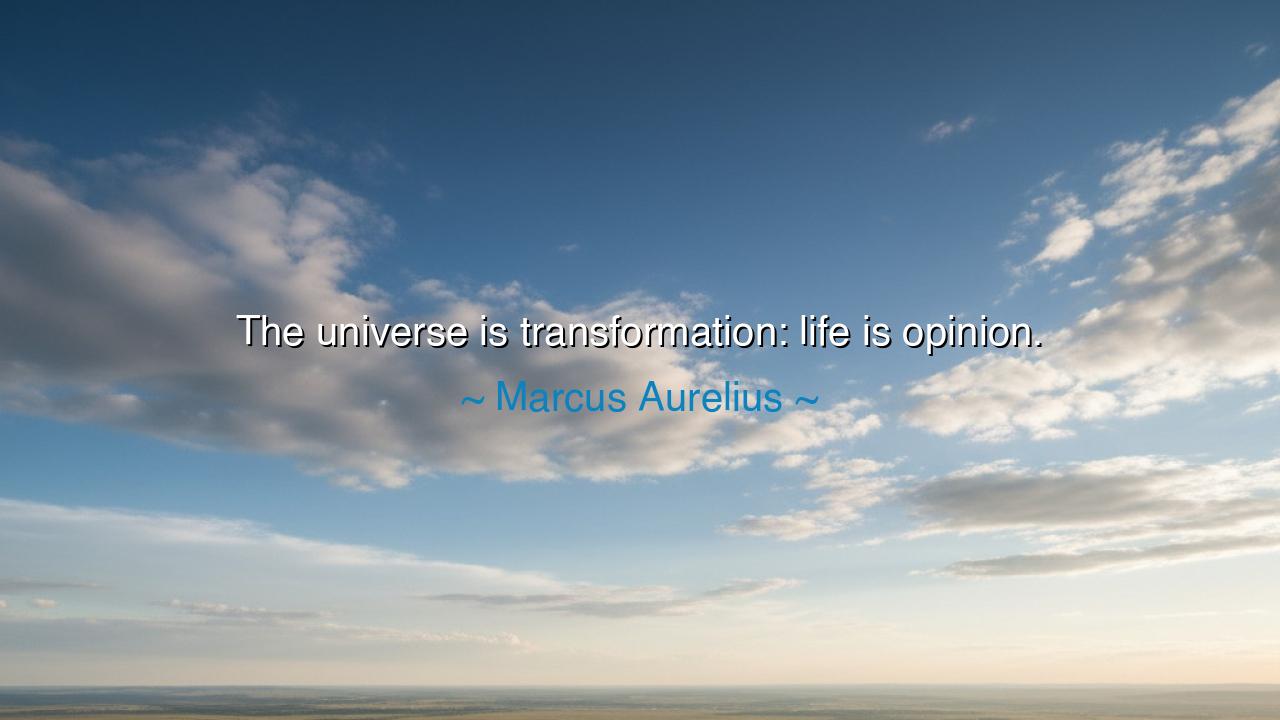
The universe is transformation: life is opinion.






Hear the wisdom of Marcus Aurelius, emperor and philosopher, who ruled Rome yet bowed his spirit to truth: “The universe is transformation: life is opinion.” These words, written in his private Meditations, were not meant for the applause of men but for the guidance of his own soul. Yet they endure, like a flame across the centuries, teaching us that all things in existence are in flux, ever-changing, while the meaning we attach to them rests not in reality itself but in the judgments of our minds.
The universe, Aurelius reminds us, is not still. Stars are born, mountains erode, rivers carve valleys, empires rise and fall. Nothing that lives remains as it is; all is transformation. To resist this truth is to resist the nature of existence itself. The Stoics called us to accept change not as enemy but as law, to see in death, decay, and loss not tragedy alone but the eternal turning of the wheel. For if all things transform, then all endings are beginnings, and all loss is also renewal.
But if the universe is transformation, what then is life? Aurelius answers: it is opinion. That is, life is not what happens to us, but what we think of what happens. The farmer and the soldier may endure the same storm, yet one curses it while the other rejoices in its rains. The same event, the same world, but two different lives—because opinion shapes experience. Here lies the essence of Stoic wisdom: control what you can, your judgment, your response, your view of things, and you will find freedom even amidst chaos.
History gives us many witnesses to this truth. Consider Epictetus, once a slave, beaten and chained. Though his body was bound, his spirit remained unconquered, for he declared that no man could enslave his mind. He accepted the transformation of his fate, but he shaped his life through the dignity of his opinion. He saw himself not as victim but as philosopher, and his teachings inspired emperors themselves. Thus we see: the measure of life is not in circumstances, but in how the soul interprets them.
Even Aurelius himself lived this teaching. As emperor, he endured war, plague, and betrayal. The empire was crumbling at its edges, yet he found calm not in illusions of control, but in the recognition that all was transformation. He could not prevent change, but he could govern his thoughts. He wrote: “You have power over your mind—not outside events. Realize this, and you will find strength.” His reign proved that greatness lies not in bending the universe to your will, but in harmonizing your will with the universe’s eternal changes.
The meaning of this teaching is both liberating and sobering. If all is transformation, then we must let go of our clinging to permanence. If life is opinion, then we must master our judgments, training them to see with clarity, gratitude, and courage. The external world cannot guarantee peace, but the mind can. Therefore, peace is not found in riches, fame, or power, but in wisdom: in the art of shaping opinion rightly, and in embracing change as the nature of all things.
What then shall we do? Practice daily the art of reframing. When hardship comes, ask not, “Why me?” but, “What can I learn?” When change sweeps away what you love, remind yourself: all was given to you as a gift of time, never as possession. When you find yourself judging, pause and ask: is this opinion helping me live wisely, or binding me in chains of anger and fear? In this practice, you will live as Aurelius lived—not above the storms, but steady within them.
Therefore, O listener, carry this truth as armor: The universe is transformation; life is opinion. Accept the flow of change as the law of existence, and train your mind to see with strength and gratitude. In doing so, you will discover freedom, not by mastering the world, but by mastering yourself. And this is the true kingdom, greater than empires: the unshakable kingdom of the soul.






AAdministratorAdministrator
Welcome, honored guests. Please leave a comment, we will respond soon